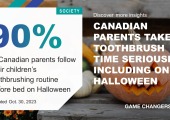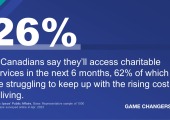SIX IN TEN (58%) BELIEVE EATON'S DID NOT KEEP UP WITH SHOPPERS' NEEDS
HIGH PRICES (33%), MISMANAGEMENT (23%), COMPETITION (21%) AND "NOT CHANGING WITH THE TIMES" (17%) ARE THOUGHT TO BE RESPONSIBLE FOR EATON'S FAILURE
SIX IN TEN (58%) BELIEVE EATON'S DID NOT KEEP UP WITH SHOPPERS' NEEDS AND ITS CLOSING MAKES ROOM FOR BETTER STORES AND CANADA'S RETAIL INDUSTRY WILL BE STRONGER BECAUSE OF IT
HIGH PRICES (33%), MISMANAGEMENT (23%), COMPETITION (21%) AND "NOT CHANGING WITH THE TIMES" (17%) ARE THOUGHT TO BE RESPONSIBLE FOR EATON'S FAILURE
A MERE 12% OF CANADIANS SAY EATON'S HAD "EXACTLY WHAT THEY WANT" -- WAL-MART, SEARS, ZELLERS AND THE BAY ARE STORES THAT ARE VIEWED AS "KEEPING UP WITH WHAT SHOPPERS WANT"
This Angus Reid Group/Globe and Mail/ROB TV poll is based on a national telephone survey conducted between September 7th and September 12th, 1999 among a representative cross-section of 1,500 Canadian adults. These data are statistically weighted to ensure the sample's regional, age and sex composition reflects that of the actual Canadian population according to 1996 Census data.
With a national sample of 1,500, one can say with 95 percent certainty that the overall results are within +2.5 percentage points of what they would have been had the entire adult Canadian population been polled. The margin of error will be larger for other sub-groupings of the survey population.
Eaton's of Canada is currently liquidating its stock for final closure. Reflecting on Eaton's failure, a majority (58%) of Canadians say that Eaton's did not keep up with shoppers needs and "its closing makes room for better stores and Canada's retail industry will be stronger because of it". High prices (33%), mismanagement (23%), competition (21%) and "not changing with the times" (17%) are thought to be responsible for Eaton's failure. Wal-Mart (40%), Sears (36%), Zellers (29%) and The Bay (27%) are stores Canadians believe are "keeping up with what shoppers want". Canadians indicate that "they liked Eaton's, but other stores are just as good" (40%) or "Eaton's was okay, but they prefer other stores" (45%). A mere 12% say Eaton's had "exactly what they want".
These are the highlights gleaned from a national Angus Reid Group/ROB TV/Globe and Mail telephone survey of 1,500 Canadian adults. Interviews were conducted between September 7th and September 12th, 1999. A sample size of 1,500 is said to have a corresponding margin of error of +2.5 percentage points, 19 times out of 20.
"SIX IN TEN (58%) BELIEVE EATON'S DID NOT KEEP UP WITH SHOPPERS NEEDS AND "ITS CLOSING MAKES ROOM FOR BETTER STORES AND CANADA'S RETAIL INDUSTRY WILL BE STRONGER BECAUSE OF IT"
In fact, six in ten (58%) believe Eaton's did not keep up with shoppers needs and "its closing makes room for better stores and Canada's retail industry will be stronger because of it". When asked to choose, another 37% are more likely to believe that "the only thing wrong with Eaton's was the sales war other retailers were fighting; its closing means less choice and Canada's retail industry will be weaker because of it". Five percent suggested that "it depends" or were not able to respond to the question.
- Men (63%) and high-income earners (62%) are most likely to support the argument that "Eaton's did not keep up with shoppers needs and "its closing makes room for better stores and Canada's retail industry will be stronger because of it".
- Younger Canadians (aged 18 to 34, 42%) and women (42%) are most likely to believe "the only thing wrong with Eaton's was the sales war other retailers were fighting; its closing means less choice and Canada's retail industry will be weaker because of it".
HIGH PRICES (33%), MISMANAGEMENT (23%), COMPETITION (21%) AND "NOT CHANGING WITH THE TIMES" (17%) ARE THOUGHT TO BE RESPONSIBLE FOR EATON'S FAILURE
Canadians are asked "what do you think went wrong and why has Eaton's failed?" High prices (33%), mismanagement (23%), competition (21%) and "not changing with the times" (17%) are thought to be responsible for Eaton's downfall. Other reasons commonly provided include: "high end merchandise that average people/families can't afford" (8%), poor financial management (7%), "lack of interest from and ability in Eaton family" (7%) and less effective sales, marketing and advertising than other stores (6%).
- Atlantic Canadians (42%), 18 to 54 year olds (35%), women (39%) and those earning less than $30,000 (39%) are most likely to blame high prices for Eaton's failure.
- Canadians aged 18 to 34 (24%), men (24%) and high-income earners (25%) are most likely to mention "competition with other department stores" as the cause of Eaton's demise.
Residents of Saskatchewan/Manitoba (23%), older Canadians (55+, 20%), men (21%) and high-income earners (25%) are most likely to suggest that Eaton's was "out of touch with customers".
WAL-MART (40%), SEARS (36%), ZELLERS (29%) AND THE BAY (27%) - STORES THAT ARE "KEEPING UP WITH WHAT SHOPPERS WANT"
When asked "which stores in Canada have been getting better by keeping up with what shoppers want, Wal-Mart (40%), Sears (36%), Zellers (29%) and The Bay (27%) are mentioned most often. Other stores frequently mentioned include: Canadian Tire (14%), Home Depot (4%) and the Price Club/Costco (4%).
MOST CANADIANS SAY THEY "LIKED EATON'S, BUT OTHER STORES ARE JUST AS GOOD" (40%) OR "EATON'S WAS OKAY, BUT THEY PREFER OTHER STORES" (45%) - 12% SAY EATON'S HAD "EXACTLY WHAT THEY WANT"
Most Canadians say "they liked Eaton's, but other stores are just as good" (40%) or "Eaton's was okay, but they prefer other stores" (45%). A mere 12% say Eaton's had "exactly what they want".
- Ontarians 55 years and older (20%) are most likely to say they "really liked Eaton's" and "it had exactly what they want".
For further information contact:
Janet Lazaris
Senior Vice President, Retail
Angus Reid Group
(416) 324-2900
The Angus Reid Group is Canada's largest and most well-known Canadian research company. Established in 1979 by Dr. Angus Reid, the company serves 1200 clients via its six offices in Canada, four offices in the United States and its European office in London, England. With a complement of 250 full time qualitative and quantitative researchers, the company has annual revenues of $65 million and is growing at an average rate of 30 percent per year. The employee-owned company also operates its own field service entity, Direct Reid, utilizing 450 CATI (computer-assisted telephone interviewing) stations for North American calling and a 50,000 household consumer panel in Canada.
More insights about Consumer Goods


![[WEBINAR] KEYS: Global Trends - The Uneasy Decade](/sites/default/files/styles/related_more_insights/public/ct/event/2025-09/thumbnail-templates_0.png?itok=Qh37M2xL)
![[WEBINAR] Canadian EV Adoption Trends in 2025](/sites/default/files/styles/related_more_insights/public/ct/event/2025-01/thumb.png?itok=RSGzZvMm)
![[WEBINAR] Sustainable Packaging: A Potential Avenue of Distinction](/sites/default/files/styles/related_more_insights/public/ct/event/2023-09/SustainablePackaging_WebR_feature%20copy.jpg?itok=X0DpNf_C)